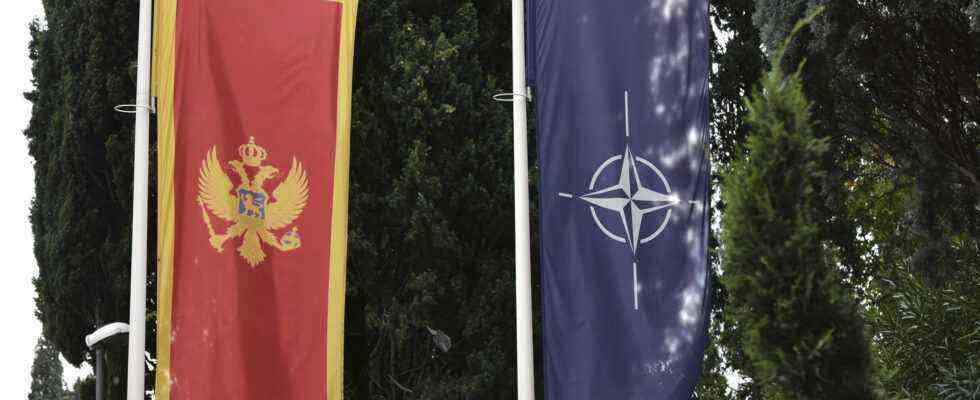Status: 01/22/2022 09:20 a.m
Four years ago, the Balkan state of Montenegro joined NATO – against Russia’s resistance. Today, popular support for NATO is the lowest of any member state. How could this happen?
Geographically and on paper, Montenegro and Ukraine have little in common. But the events on the Black Sea have also had an impact on the Balkans for years. As early as 2017, when Montenegro joined NATO, Russia’s reaction was largely determined by developments in Ukraine.
With Montenegro, the smallest former republic of Yugoslavia aspired to the alliance. Their influence in the region had already grown significantly as a result of the eastward expansion in 2004. And now Montenegro – while in Kiev, under the influence of the annexation of Crimea, the Ukrainian government was reviving Russia’s earlier plans for NATO membership?
For Russia, both were a provocation. Under no circumstances should the small Adriatic country join the military alliance. Moscow feared for its influence on the Balkan Peninsula.
sense of threat
Like today, Russia felt threatened. The accession of Montenegro would strengthen the militarists, it was said at the time. Allegedly, Russia was even involved in a coup against the then Prime Minister and current President Milo Djukanovic. Fourteen people were later convicted in connection with this alleged coup d’etat for the 2016 elections, including two representatives of the pro-Russian parties and also two members of the Russian secret service.
But the evidence was thin. Weapon boxes, which were apparently found, could not be presented in court as evidence.
Parallels to today’s crisis
When Montenegro joined NATO in 2017, Western-oriented forces prevailed, above all the man who has decisively determined the country’s fate for more than 30 years, today’s President Djukanovic. In June 2021, he tweeted: “Fourth anniversary of the greatest international achievement of the modern Montenegrin state – NATO membership”.
His opponents, and therefore also opponents of NATO, are the pro-Serbian and pro-Russian parties that form the government today. The parties that have come together to form the “Democratic Front” would like to get out of NATO. This is also related to the air raids on Montenegro in the Balkan wars in the 1990s. And that also explains the low support of the Montenegrins to NATO.
Only 50 percent think the alliance is good. About 30 percent would like to leave it. The numbers have been stable for years.
Lowest approval of all NATO countries
Milan Kneževic is one of the biggest opponents of NATO. The socialist politician was even convicted in the first instance in 2019 for the alleged coup d’etat. He repeatedly emphasizes that his party was opposed to NATO membership, but also recognizes “the geopolitical reality, the agreements concluded and the obligations assumed with them” – they made an exit “practically impossible”.
Prime Minister, Zdravko Krivokapic, on the other hand, can certainly see positive aspects in belonging to the military alliance. On the anniversary of accession in 2021, he said: “Montenegro is a stable, reliable and committed NATO member, which strengthens its political position and makes Montenegro’s path towards the EU easier.”
Militarily hardly important – geostrategically yes
With around 2000 soldiers and 600,000 inhabitants, Montenegro is not really important militarily. Air surveillance is provided by Italy and Greece. There are no NATO military bases in the country. NATO is not a particular economic entity, and the Alliance’s liaison office is housed in the Montenegrin Ministry of Defence. It has been a long time since the last report about NATO activities, when some ships were briefly in the port of Bar.
Geostrategically, however, Montenegro is important. The protected Bay of Kotor was already used by the Yugoslav Navy. With Montenegro, NATO has gained access to the entire Adriatic coast. Slovenia, Croatia and Albania, which was even a Soviet naval base after the World War, also belong to the alliance. North Macedonia became a member in 2020. Bulgaria, Hungary and Romania have been there for a long time. NATO troops are stationed in Bosnia-Herzegovina. The Balkans are NATO territory.
Nevertheless, former US President Donald Trump caused at least irritation because of Montenegro. Trump questioned NATO in general in 2018, naming Montenegro in the context of a third world war. In a television interview, Trump said. “Montenegro is a small country with very strong people. They are very aggressive people, they could become aggressive and – congratulations – it’s World War III.” However, Trump also admitted that in the event of a crisis, US soldiers would also be sent to Montenegro.
In case of doubt, NATO will also declare an alliance for Montenegro, even if a considerable part of the population is skeptical about the alliance. This insight, too, is likely to have an impact beyond the country and influence the debate about Ukraine and NATO.

